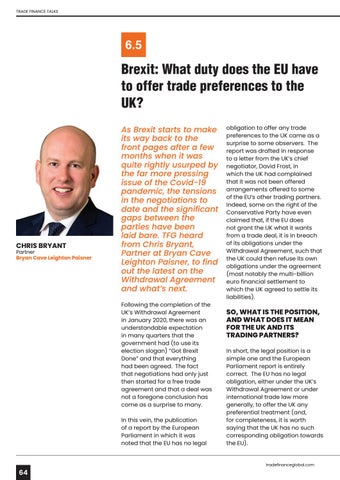TRADE FINANCE TALKS
6.5
Brexit: What duty does the EU have to offer trade preferences to the UK?
CHRIS BRYANT
Partner Bryan Cave Leighton Paisner
As Brexit starts to make its way back to the front pages after a few months when it was quite rightly usurped by the far more pressing issue of the Covid-19 pandemic, the tensions in the negotiations to date and the significant gaps between the parties have been laid bare. TFG heard from Chris Bryant, Partner at Bryan Cave Leighton Paisner, to find out the latest on the Withdrawal Agreement and what’s next. Following the completion of the UK’s Withdrawal Agreement in January 2020, there was an understandable expectation in many quarters that the government had (to use its election slogan) “Got Brexit Done” and that everything had been agreed. The fact that negotiations had only just then started for a free trade agreement and that a deal was not a foregone conclusion has come as a surprise to many. In this vein, the publication of a report by the European Parliament in which it was noted that the EU has no legal
64
obligation to offer any trade preferences to the UK came as a surprise to some observers. The report was drafted in response to a letter from the UK’s chief negotiator, David Frost, in which the UK had complained that it was not been offered arrangements offered to some of the EU’s other trading partners. Indeed, some on the right of the Conservative Party have even claimed that, if the EU does not grant the UK what it wants from a trade deal, it is in breach of its obligations under the Withdrawal Agreement, such that the UK could then refuse its own obligations under the agreement (most notably the multi-billion euro financial settlement to which the UK agreed to settle its liabilities).
SO, WHAT IS THE POSITION, AND WHAT DOES IT MEAN FOR THE UK AND ITS TRADING PARTNERS? In short, the legal position is a simple one and the European Parliament report is entirely correct. The EU has no legal obligation, either under the UK’s Withdrawal Agreement or under international trade law more generally, to offer the UK any preferential treatment (and, for completeness, it is worth saying that the UK has no such corresponding obligation towards the EU). tradefinanceglobal.com

















